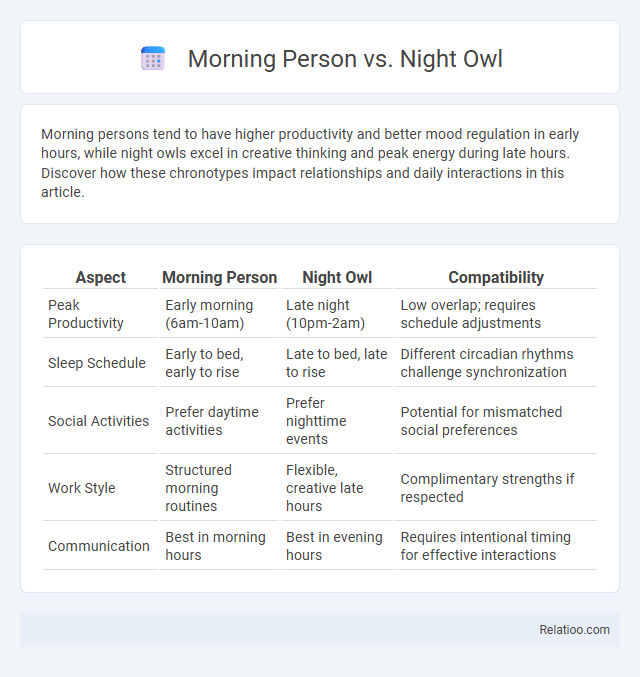Morning persons tend to have higher productivity and better mood regulation in early hours, while night owls excel in creative thinking and peak energy during late hours. Discover how these chronotypes impact relationships and daily interactions in this article.
Table of Comparison
| Aspect | Morning Person | Night Owl | Compatibility |
|---|---|---|---|
| Peak Productivity | Early morning (6am-10am) | Late night (10pm-2am) | Low overlap; requires schedule adjustments |
| Sleep Schedule | Early to bed, early to rise | Late to bed, late to rise | Different circadian rhythms challenge synchronization |
| Social Activities | Prefer daytime activities | Prefer nighttime events | Potential for mismatched social preferences |
| Work Style | Structured morning routines | Flexible, creative late hours | Complimentary strengths if respected |
| Communication | Best in morning hours | Best in evening hours | Requires intentional timing for effective interactions |
Understanding Morning People and Night Owls
Morning people typically experience peak alertness and productivity during early hours, benefiting from consistent sleep patterns aligned with natural circadian rhythms. Night owls, conversely, reach their highest cognitive performance later in the day, often facing challenges with traditional 9-to-5 schedules. Understanding your chronotype can optimize your lifestyle choices, enhancing both work efficiency and overall well-being.
The Science Behind Your Chronotype
Chronotypes, biologically driven patterns that determine whether someone is a Morning Person or Night Owl, are regulated by the circadian rhythm controlled by the suprachiasmatic nucleus in the brain. Genetic variations in clock genes such as PER3 significantly influence individual sleep-wake preferences and peak cognitive performance times. Lifestyle factors, including exposure to natural light and work schedules, interact with these innate biological rhythms, impacting health, productivity, and overall well-being.
Biological Factors Influencing Sleep Patterns
Biological factors such as genetics and circadian rhythms significantly influence whether someone is a morning person or a night owl, shaping their natural sleep-wake cycles. Variations in the production of melatonin, a hormone regulating sleep, affect individual alertness peaks and energy levels throughout the day. Understanding these inherent biological differences can guide lifestyle adjustments to enhance productivity and overall well-being.
Productivity: Morning vs Night Performance
Your productivity peaks depend on whether you are a morning person or a night owl, as circadian rhythms influence cognitive function and alertness at different times of the day. Morning people often experience higher focus and efficiency during early hours, leading to enhanced task completion and decision-making, while night owls tend to have increased creativity and problem-solving skills during late hours. Adapting your lifestyle to match your natural productivity patterns can optimize work output and overall performance.
Mental Health: How Sleep Timing Impacts Well-being
Sleep timing significantly influences mental health, with morning persons often exhibiting lower levels of depression and anxiety compared to night owls. Circadian rhythms regulate hormonal balance and brain function, impacting mood stability and cognitive performance. Adopting a consistent sleep schedule aligned with individual chronotypes enhances psychological resilience and overall well-being.
Relationships and Social Life: Synchronizing Schedules
Morning persons often thrive in relationships by aligning early routines, enhancing shared morning activities and communication, while night owls may face challenges due to mismatched sleep patterns and social energy peaks. Synchronizing schedules in partnerships that combine both chronotypes requires strategic planning, such as designating overlapping social times and respecting individual downtime to foster connection and prevent friction. Lifestyle adaptations, including flexible work hours and coordinated social engagements, play a crucial role in balancing personal rhythms with relationship needs, promoting harmony and social well-being.
Career Choices: Does Your Chronotype Matter?
Career choices often align with an individual's chronotype, influencing productivity and job satisfaction. Morning people tend to excel in roles requiring early starts and consistent schedules, such as management or finance, while night owls thrive in creative or flexible jobs like graphic design or software development. Understanding one's natural sleep-wake patterns can improve work performance and overall lifestyle balance.
Tips for Embracing Your Natural Rhythm
Align daily tasks with your peak energy periods by scheduling demanding work during your natural high-performance times, whether morning or night. Prioritize consistent sleep patterns and create a sleep-friendly environment to enhance rest quality, matching your chronotype. Incorporate lifestyle habits like regular exercise, balanced nutrition, and mindfulness practices to support your body's circadian rhythm and overall well-being.
Adapting Your Routine for Better Sleep Hygiene
Understanding whether you're a morning person or a night owl helps tailor your lifestyle to improve sleep hygiene effectively. Adjusting your sleep schedule, exposure to natural light, and daily activities to match your circadian rhythm supports consistent rest and overall well-being. You can enhance your sleep quality by aligning your routine with your natural biological clock, promoting better energy and health.
Finding Balance: Can You Change Your Chronotype?
Understanding chronotypes reveals that Morning Persons naturally wake early and peak in productivity before noon, while Night Owls experience heightened alertness later in the day, affecting lifestyle choices and work schedules. Research indicates that although genetics largely determine chronotype, gradual adjustments in sleep patterns, exposure to natural light, and consistent routines can shift circadian rhythms to some extent. Achieving balance requires aligning daily habits with personal biological clocks, allowing individuals to optimize energy levels and productivity without forcing drastic or unsustainable changes.

Infographic: Morning Person vs Night Owl
 relatioo.com
relatioo.com